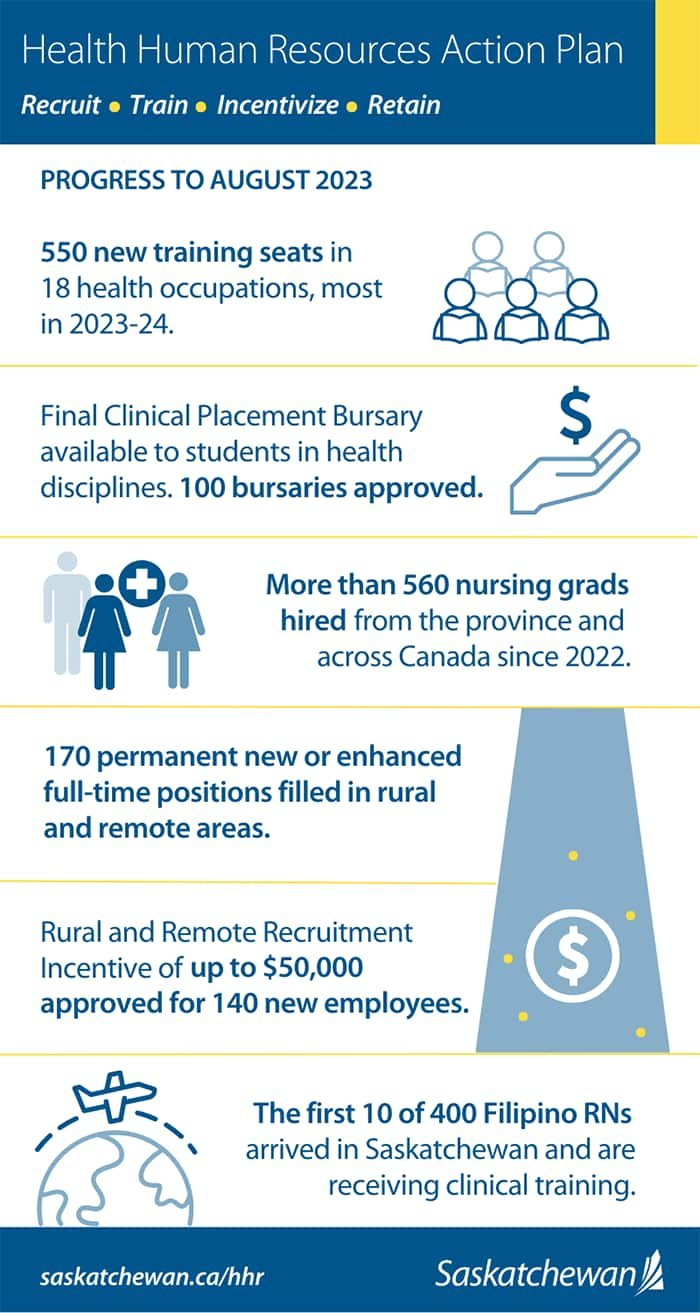Province continues to invest in health care opportunities as students head back to school
The Government of Saskatchewan continues to incentivize health care training opportunities for Saskatchewan students and graduates as a main pillar of the four point Health Human Resources (HHR) Action Plan.
The 2023-24 academic year will increase access to educational opportunities for students interested in a health care career by providing approximately 550 new training seats in 18 high demand health occupations, an expansion announced earlier this year. This initiative builds upon the addition of 150 nursing seats announced in 2022.
"Saskatchewan is a great place to train and build a career in health care," Health Minister Paul Merriman said. "As we prepare for the upcoming school year, our government continues to prioritize enhancing opportunities to train more health-care professionals here at home and help them succeed."
New training opportunities are being offered to Indigenous students including a Phlebotomy (blood collection) Program and an Indigenous Birth Support Worker Program now available at Gabriel Dumont Institute. Further, the Saskatchewan Indian Institute of Technologies is offering more seats in 2023 for the Health Care Aid Program in Prince Albert.
The College of Medicine at the University of Saskatchewan recently announced expanding the upcoming fall 2023 intake of medical students to the undergraduate program by four seats. This will increase the total number of seats from 100 to 104, with further plans to reach 108 seats next year.
Financial supports are available to domestic students and graduates pursuing a career in health care, including forgivable loans, bursaries and recruitment incentives to stay in Saskatchewan following graduation.
The Final Clinical Placement Bursary program available to students in eligible health disciplines has seen a high uptake, with 100 bursaries approved since April. Applications are open until September 30, 2023.
Training bursaries were recently announced for students and new graduates of paramedic programs who commit to joining Emergency Medical Services (EMS) in Saskatchewan.
Additional educational opportunities include seats secured through interprovincial training agreements. Saskatchewan students will be able to access 15 seats at the University of Alberta in the Speech Language Pathology program and four seats secured at the British Columbia Institute of Technology in the Environmental Public Health program.
Work is ongoing on multiple initiatives of Saskatchewan's HHR Action Plan to recruit, train, incentivize and retain more health-care workers with progress being made in key areas.
HHR Progress Update Highlights
The Saskatchewan Health Authority has had great success connecting with nursing students and recent graduates to promote employment opportunities. Since December 2022, the SHA has hired more than 560 new graduates from the province and across Canada.
Almost 170 positions are now filled of the 250 new and enhanced permanent full-time positions targeted to stabilize staffing in rural and remote areas of the province.
The Rural and Remote Recruitment Incentive of up to $50,000 available to new employees in nine high priority classifications in 53 rural and remote areas continues to see much interest, with nearly 140 incentives conditionally approved to date.
In late August, Saskatchewan will begin implementing an accelerated, streamlined pathway for internationally-educated nurses that shortens licensure timeframes from months to 14 weeks. Nurse recruits from abroad will be supported through the process, from recruitment through to their work placements and settlement in a new community.
The first 10 of the 400 Registered Nurses (RNs) with conditional offers from the Philippines arrived to Saskatchewan in July and are participating in clinical training. Once clinical training is complete these RNs will be eligible for licensure and ready to begin working in Saskatchewan's health system.
Nineteen Continuing Care Assistants (CCAs) and two Medical Laboratory Assistants (MLAs) from the Philippines arrived earlier in 2023 and are working in communities across the province, particularly rural and remote locations.
Details on health care opportunities, how to access them and more information on the province's HHR Action Plan are available at saskatchewan.ca/HHR.

